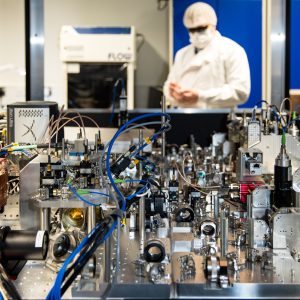
US-based quantum computing firm IonQ has agreed to acquire Oxford Ionics, a quantum computing spin-off from the University of Oxford, in a deal valued at $1.075bn. The transaction will be executed through $1.065bn in IonQ’s common stock, alongside approximately $10m in cash, subject to standard closing adjustments. This announcement led to IonQ’s shares rising nearly 4% in premarket trading, with the company’s valuation reported at $10.15bn as of the last closing on Monday.
IonQ, which is engaged in quantum computing and networking advancements using trapped ion technology, aims to address complex commercial and research challenges with this acquisition. Established in 2019, Oxford Ionics is known for its high-fidelity rates in quantum operations. The merger intends to integrate IonQ’s quantum computing, application, and networking capabilities with Oxford Ionics’ ion-trap technology, which is built on conventional semiconductor chips. The parties expect this integration to enable the creation of powerful and scalable quantum computers with advanced problem-solving capabilities.
“We believe the advantages of our combined technologies will set a new standard within quantum computing and deliver superior value for our customers through market-leading enterprise applications,” said IonQ CEO Niccolo de Masi.
The deal highlights strategic cooperation between the US and the UK, aimed at advancing next-generation technologies. Both companies anticipate leveraging each other’s complementary technologies and global expertise. The combined entity plans to drive innovation across sectors such as drug discovery, financial modelling, materials science, logistics, cybersecurity, aerospace, and defence. By 2026, they aim to develop systems with 256 physical qubits and reach 2 million physical qubits by the end of this decade.
Market potential for quantum computing projected at $850bn by 2040
According to Boston Consulting Group, the quantum computing market could generate up to $850bn in global economic value by 2040. The management teams of IonQ and Oxford Ionics expect that their merger will pioneer breakthroughs in quantum computing and drive substantial revenue growth through disruptive applications.
Post-acquisition, Oxford Ionics’ founders, Dr Chris Ballance and Dr Tom Harty, are likely to stay with IonQ, continuing their work on quantum technology development in the UK. The combined company plans to increase its workforce in Oxford to strengthen the UK’s position as a quantum computing leader while maintaining current customer relationships, including government partnerships in both the UK and the US.
“At Oxford Ionics, we have not only pioneered the most accurate quantum platform on the market – we have also engineered a quantum chip capable of being manufactured in standard semiconductor fabs,” said Balance.
The deal, which is contingent on securing the mandated regulatory approvals and meeting other conditions, is anticipated to close later this year.
This acquisition follows IonQ’s recent momentum in quantum computing and networking advancements. Recently, IonQ acquired Lightsynq Technologies, a Boston-based firm specialising in photonic interconnects and quantum memory essential for scaling quantum computers. Additionally, IonQ has signed an agreement last month to acquire Capella Space to develop a space-to-space and space-to-ground satellite quantum key distribution network.






